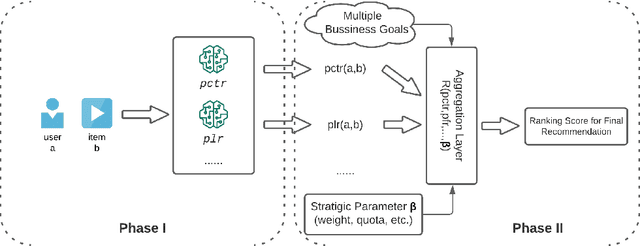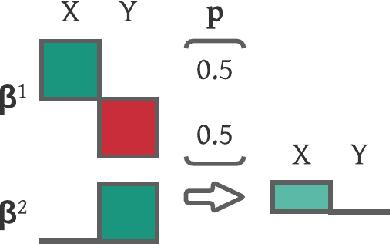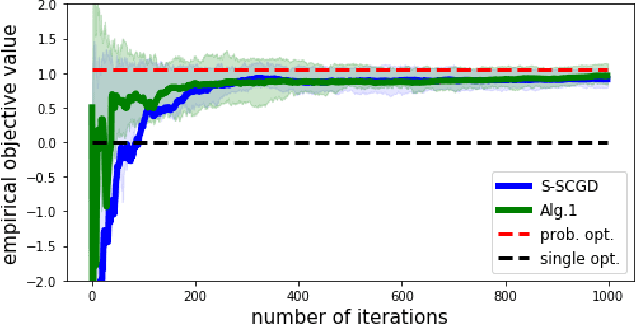Yongqi Liu
Towards End-to-End Alignment of User Satisfaction via Questionnaire in Video Recommendation
Jan 28, 2026Abstract:Short-video recommender systems typically optimize ranking models using dense user behavioral signals, such as clicks and watch time. However, these signals are only indirect proxies of user satisfaction and often suffer from noise and bias. Recently, explicit satisfaction feedback collected through questionnaires has emerged as a high-quality direct alignment supervision, but is extremely sparse and easily overwhelmed by abundant behavioral data, making it difficult to incorporate into online recommendation models. To address these challenges, we propose a novel framework which is towards End-to-End Alignment of user Satisfaction via Questionaire, named EASQ, to enable real-time alignment of ranking models with true user satisfaction. Specifically, we first construct an independent parameter pathway for sparse questionnaire signals by combining a multi-task architecture and a lightweight LoRA module. The multi-task design separates sparse satisfaction supervision from dense behavioral signals, preventing the former from being overwhelmed. The LoRA module pre-inject these preferences in a parameter-isolated manner, ensuring stability in the backbone while optimizing user satisfaction. Furthermore, we employ a DPO-based optimization objective tailored for online learning, which aligns the main model outputs with sparse satisfaction signals in real time. This design enables end-to-end online learning, allowing the model to continuously adapt to new questionnaire feedback while maintaining the stability and effectiveness of the backbone. Extensive offline experiments and large-scale online A/B tests demonstrate that EASQ consistently improves user satisfaction metrics across multiple scenarios. EASQ has been successfully deployed in a production short-video recommendation system, delivering significant and stable business gains.
S$^2$GR: Stepwise Semantic-Guided Reasoning in Latent Space for Generative Recommendation
Jan 26, 2026Abstract:Generative Recommendation (GR) has emerged as a transformative paradigm with its end-to-end generation advantages. However, existing GR methods primarily focus on direct Semantic ID (SID) generation from interaction sequences, failing to activate deeper reasoning capabilities analogous to those in large language models and thus limiting performance potential. We identify two critical limitations in current reasoning-enhanced GR approaches: (1) Strict sequential separation between reasoning and generation steps creates imbalanced computational focus across hierarchical SID codes, degrading quality for SID codes; (2) Generated reasoning vectors lack interpretable semantics, while reasoning paths suffer from unverifiable supervision. In this paper, we propose stepwise semantic-guided reasoning in latent space (S$^2$GR), a novel reasoning enhanced GR framework. First, we establish a robust semantic foundation via codebook optimization, integrating item co-occurrence relationship to capture behavioral patterns, and load balancing and uniformity objectives that maximize codebook utilization while reinforcing coarse-to-fine semantic hierarchies. Our core innovation introduces the stepwise reasoning mechanism inserting thinking tokens before each SID generation step, where each token explicitly represents coarse-grained semantics supervised via contrastive learning against ground-truth codebook cluster distributions ensuring physically grounded reasoning paths and balanced computational focus across all SID codes. Extensive experiments demonstrate the superiority of S$^2$GR, and online A/B test confirms efficacy on large-scale industrial short video platform.
DualGR: Generative Retrieval with Long and Short-Term Interests Modeling
Nov 16, 2025Abstract:In large-scale industrial recommendation systems, retrieval must produce high-quality candidates from massive corpora under strict latency. Recently, Generative Retrieval (GR) has emerged as a viable alternative to Embedding-Based Retrieval (EBR), which quantizes items into a finite token space and decodes candidates autoregressively, providing a scalable path that explicitly models target-history interactions via cross-attention. However, three challenges persist: 1) how to balance users' long-term and short-term interests , 2) noise interference when generating hierarchical semantic IDs (SIDs), 3) the absence of explicit modeling for negative feedback such as exposed items without clicks. To address these challenges, we propose DualGR, a generative retrieval framework that explicitly models dual horizons of user interests with selective activation. Specifically, DualGR utilizes Dual-Branch Long/Short-Term Router (DBR) to cover both stable preferences and transient intents by explicitly modeling users' long- and short-term behaviors. Meanwhile, Search-based SID Decoding (S2D) is presented to control context-induced noise and enhance computational efficiency by constraining candidate interactions to the current coarse (level-1) bucket during fine-grained (level-2/3) SID prediction. % also reinforcing intra-class consistency. Finally, we propose an Exposure-aware Next-Token Prediction Loss (ENTP-Loss) that treats "exposed-but-unclicked" items as hard negatives at level-1, enabling timely interest fade-out. On the large-scale Kuaishou short-video recommendation system, DualGR has achieved outstanding performance. Online A/B testing shows +0.527% video views and +0.432% watch time lifts, validating DualGR as a practical and effective paradigm for industrial generative retrieval.
UMRE: A Unified Monotonic Transformation for Ranking Ensemble in Recommender Systems
Aug 11, 2025Abstract:Industrial recommender systems commonly rely on ensemble sorting (ES) to combine predictions from multiple behavioral objectives. Traditionally, this process depends on manually designed nonlinear transformations (e.g., polynomial or exponential functions) and hand-tuned fusion weights to balance competing goals -- an approach that is labor-intensive and frequently suboptimal in achieving Pareto efficiency. In this paper, we propose a novel Unified Monotonic Ranking Ensemble (UMRE) framework to address the limitations of traditional methods in ensemble sorting. UMRE replaces handcrafted transformations with Unconstrained Monotonic Neural Networks (UMNN), which learn expressive, strictly monotonic functions through the integration of positive neural integrals. Subsequently, a lightweight ranking model is employed to fuse the prediction scores, assigning personalized weights to each prediction objective. To balance competing goals, we further introduce a Pareto optimality strategy that adaptively coordinates task weights during training. UMRE eliminates manual tuning, maintains ranking consistency, and achieves fine-grained personalization. Experimental results on two public recommendation datasets (Kuairand and Tenrec) and online A/B tests demonstrate impressive performance and generalization capabilities.
Building a Human-Verified Clinical Reasoning Dataset via a Human LLM Hybrid Pipeline for Trustworthy Medical AI
May 11, 2025Abstract:Despite strong performance in medical question-answering, the clinical adoption of Large Language Models (LLMs) is critically hampered by their opaque 'black-box' reasoning, limiting clinician trust. This challenge is compounded by the predominant reliance of current medical LLMs on corpora from scientific literature or synthetic data, which often lack the granular expert validation and high clinical relevance essential for advancing their specialized medical capabilities. To address these critical gaps, we introduce a highly clinically relevant dataset with 31,247 medical question-answer pairs, each accompanied by expert-validated chain-of-thought (CoT) explanations. This resource, spanning multiple clinical domains, was curated via a scalable human-LLM hybrid pipeline: LLM-generated rationales were iteratively reviewed, scored, and refined by medical experts against a structured rubric, with substandard outputs revised through human effort or guided LLM regeneration until expert consensus. This publicly available dataset provides a vital source for the development of medical LLMs that capable of transparent and verifiable reasoning, thereby advancing safer and more interpretable AI in medicine.
Stratified Expert Cloning with Adaptive Selection for User Retention in Large-Scale Recommender Systems
Apr 08, 2025



Abstract:User retention has emerged as a critical challenge in large-scale recommender systems, significantly impacting the long-term success of online platforms. Existing methods often focus on short-term engagement metrics, failing to capture the complex dynamics of user preferences and behaviors over extended periods. While reinforcement learning (RL) approaches have shown promise in optimizing long-term rewards, they face difficulties in credit assignment, sample efficiency, and exploration when applied to the user retention problem. In this work, we propose Stratified Expert Cloning (SEC), a novel imitation learning framework that effectively leverages abundant logged data from high-retention users to learn robust recommendation policies. SEC introduces three key innovations: 1) a multi-level expert stratification strategy that captures the nuances in expert user behaviors at different retention levels; 2) an adaptive expert selection mechanism that dynamically assigns users to the most suitable policy based on their current state and historical retention level; and 3) an action entropy regularization technique that promotes recommendation diversity and mitigates the risk of policy collapse. Through extensive offline experiments and online A/B tests on two major video platforms, Kuaishou and Kuaishou Lite, with hundreds of millions of daily active users, we demonstrate SEC's significant improvements over state-of-the-art methods in user retention. The results demonstrate significant improvements in user retention, with cumulative lifts of 0.098\% and 0.122\% in active days on Kuaishou and Kuaishou Lite respectively, additionally bringing tens of thousands of daily active users to each platform.
Comment Staytime Prediction with LLM-enhanced Comment Understanding
Apr 02, 2025



Abstract:In modern online streaming platforms, the comments section plays a critical role in enhancing the overall user experience. Understanding user behavior within the comments section is essential for comprehensive user interest modeling. A key factor of user engagement is staytime, which refers to the amount of time that users browse and post comments. Existing watchtime prediction methods struggle to adapt to staytime prediction, overlooking interactions with individual comments and their interrelation. In this paper, we present a micro-video recommendation dataset with video comments (named as KuaiComt) which is collected from Kuaishou platform. correspondingly, we propose a practical framework for comment staytime prediction with LLM-enhanced Comment Understanding (LCU). Our framework leverages the strong text comprehension capabilities of large language models (LLMs) to understand textual information of comments, while also incorporating fine-grained comment ranking signals as auxiliary tasks. The framework is two-staged: first, the LLM is fine-tuned using domain-specific tasks to bridge the video and the comments; second, we incorporate the LLM outputs into the prediction model and design two comment ranking auxiliary tasks to better understand user preference. Extensive offline experiments demonstrate the effectiveness of our framework, showing significant improvements on the task of comment staytime prediction. Additionally, online A/B testing further validates the practical benefits on industrial scenario. Our dataset KuaiComt (https://github.com/lyingCS/KuaiComt.github.io) and code for LCU (https://github.com/lyingCS/LCU) are fully released.
AlignPxtr: Aligning Predicted Behavior Distributions for Bias-Free Video Recommendations
Mar 11, 2025Abstract:In video recommendation systems, user behaviors such as watch time, likes, and follows are commonly used to infer user interest. However, these behaviors are influenced by various biases, including duration bias, demographic biases, and content category biases, which obscure true user preferences. In this paper, we hypothesize that biases and user interest are independent of each other. Based on this assumption, we propose a novel method that aligns predicted behavior distributions across different bias conditions using quantile mapping, theoretically guaranteeing zero mutual information between bias variables and the true user interest. By explicitly modeling the conditional distributions of user behaviors under different biases and mapping these behaviors to quantiles, we effectively decouple user interest from the confounding effects of various biases. Our approach uniquely handles both continuous signals (e.g., watch time) and discrete signals (e.g., likes, comments), while simultaneously addressing multiple bias dimensions. Additionally, we introduce a computationally efficient mean alignment alternative technique for practical real-time inference in large-scale systems. We validate our method through online A/B testing on two major video platforms: Kuaishou Lite and Kuaishou. The results demonstrate significant improvements in user engagement and retention, with \textbf{cumulative lifts of 0.267\% and 0.115\% in active days, and 1.102\% and 0.131\% in average app usage time}, respectively. The results demonstrate that our approach consistently achieves significant improvements in long-term user retention and substantial gains in average app usage time across different platforms. Our core code will be publised at https://github.com/justopit/CQE.
Conditional Quantile Estimation for Uncertain Watch Time in Short-Video Recommendation
Jul 17, 2024



Abstract:Within the domain of short video recommendation, predicting users' watch time is a critical but challenging task. Prevailing deterministic solutions obtain accurate debiased statistical models, yet they neglect the intrinsic uncertainty inherent in user environments. In our observation, we found that this uncertainty could potentially limit these methods' accuracy in watch-time prediction on our online platform, despite that we have employed numerous features and complex network architectures. Consequently, we believe that a better solution is to model the conditional distribution of this uncertain watch time. In this paper, we introduce a novel estimation technique -- Conditional Quantile Estimation (CQE), which utilizes quantile regression to capture the nuanced distribution of watch time. The learned distribution accounts for the stochastic nature of users, thereby it provides a more accurate and robust estimation. In addition, we also design several strategies to enhance the quantile prediction including conditional expectation, conservative estimation, and dynamic quantile combination. We verify the effectiveness of our method through extensive offline evaluations using public datasets as well as deployment in a real-world video application with over 300 million daily active users.
PASTO: Strategic Parameter Optimization in Recommendation Systems -- Probabilistic is Better than Deterministic
Aug 20, 2021



Abstract:Real-world recommendation systems often consist of two phases. In the first phase, multiple predictive models produce the probability of different immediate user actions. In the second phase, these predictions are aggregated according to a set of 'strategic parameters' to meet a diverse set of business goals, such as longer user engagement, higher revenue potential, or more community/network interactions. In addition to building accurate predictive models, it is also crucial to optimize this set of 'strategic parameters' so that primary goals are optimized while secondary guardrails are not hurt. In this setting with multiple and constrained goals, this paper discovers that a probabilistic strategic parameter regime can achieve better value compared to the standard regime of finding a single deterministic parameter. The new probabilistic regime is to learn the best distribution over strategic parameter choices and sample one strategic parameter from the distribution when each user visits the platform. To pursue the optimal probabilistic solution, we formulate the problem into a stochastic compositional optimization problem, in which the unbiased stochastic gradient is unavailable. Our approach is applied in a popular social network platform with hundreds of millions of daily users and achieves +0.22% lift of user engagement in a recommendation task and +1.7% lift in revenue in an advertising optimization scenario comparing to using the best deterministic parameter strategy.
 Add to Chrome
Add to Chrome Add to Firefox
Add to Firefox Add to Edge
Add to Edge